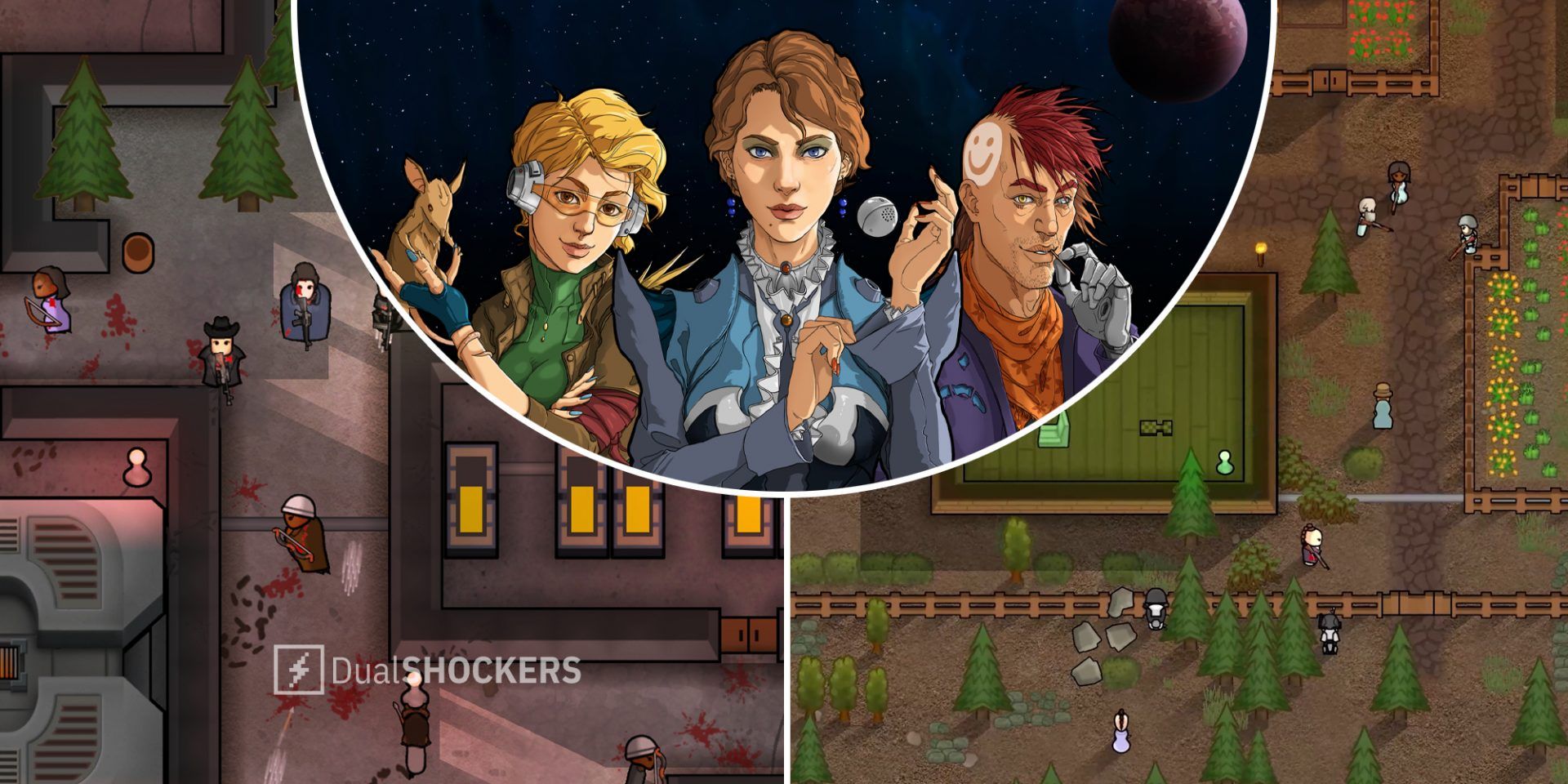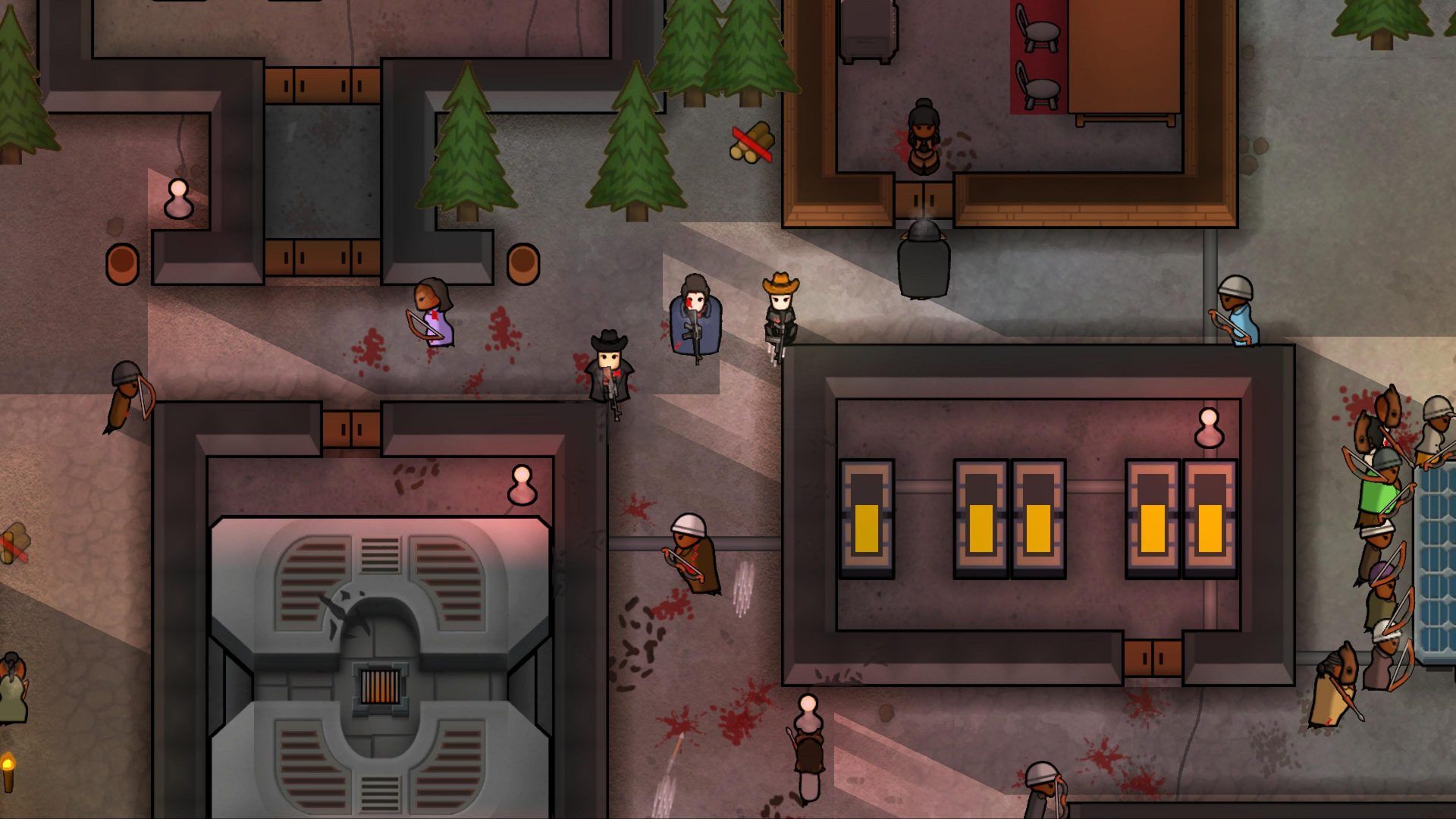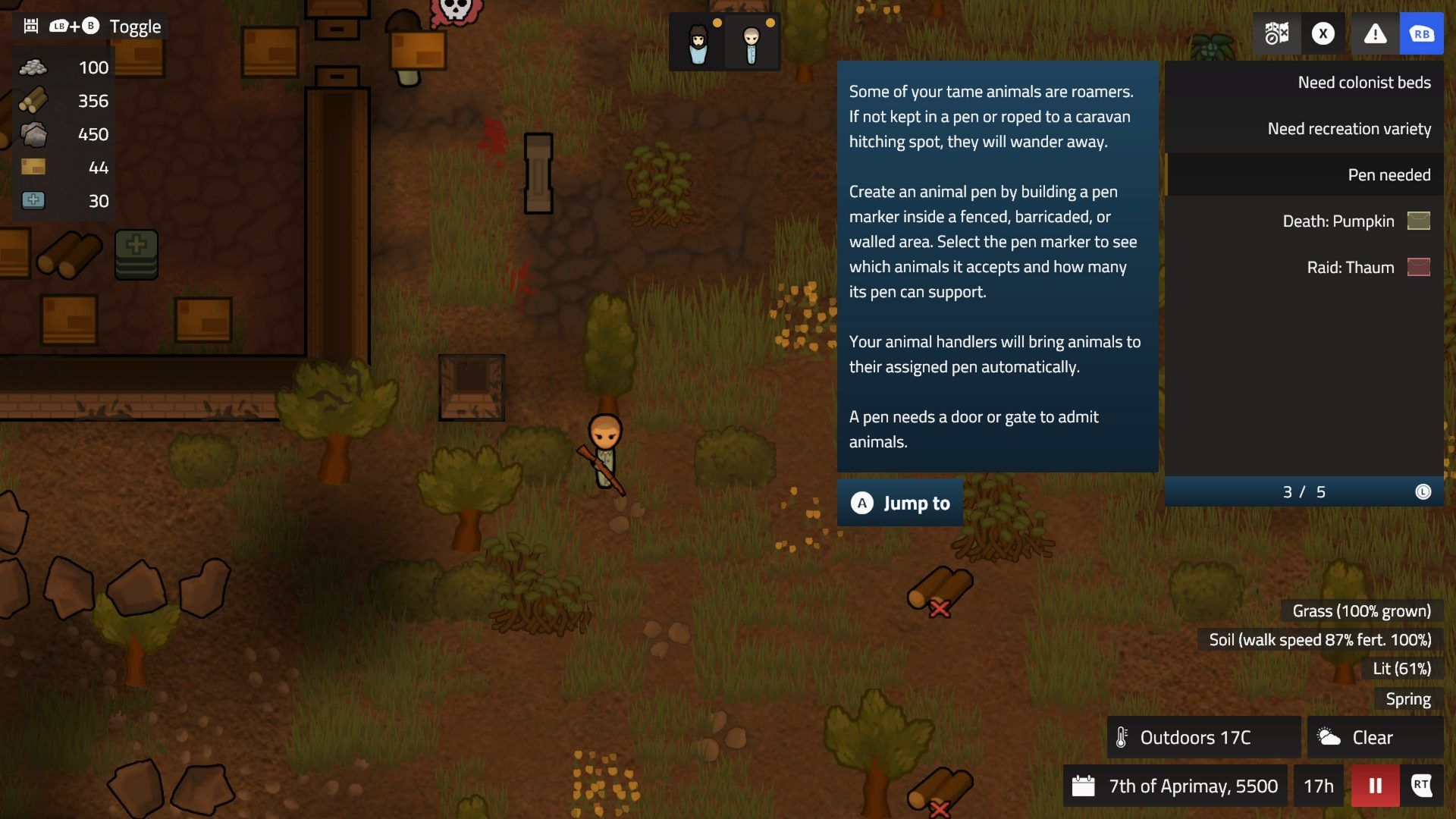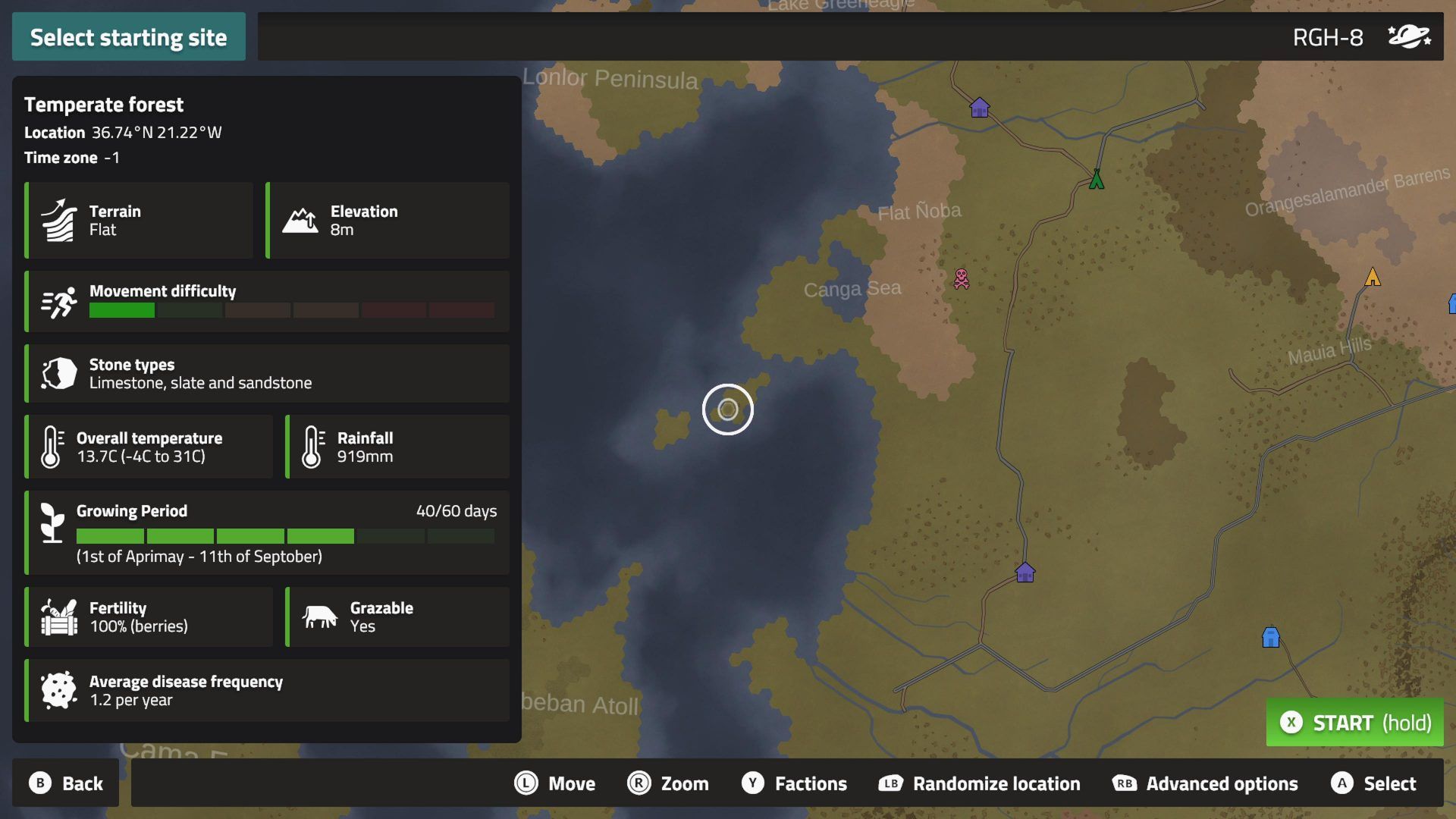RimWorld is a deep management game - an AI-and-numbers-driven colony survival simulator and story generator that, since its full launch in 2017, has been one of the most persistently played games on Steam. Being a descendant from legendary (and legendarily obscure) colony sims like Dwarf Fortress, it's a game about managing peoples' needs, stockpiling and hunkering down for harsh winters, defending against (and invading) rival tribes, establishing ideologies to unify your people, and - whether for fun or necessity - cannibalism. Its simple visual language belies one of the most moreish and compelling management and building games out there.
Until recently, 'simplistic aesthetics' and 'complex management' would've been precisely the kinds of concepts that would prevent a game from coming to consoles. These games require keyboard shortcuts, endless mouse movements, and the kind of attention spans that, historically (and probably erroneously), haven't been associated with console gamers. But times have changed, and in recent years we've seen 4X games like Civilization and Humankind, as well as deep grand strategy titles like Crusader Kings 3 and Stellaris, come to consoles - undiluted in their depth.
So RimWorld, which is coming to consoles on July 29, is riding something of a wave, but the depth of tinkering and micromanagement in this game arguably goes beyond even those games listed above. This is a game where you can make priority tables for each individual colonist, ranking the level of priority they should give to the 16 or so task categories in your colony; it's a game where you set and adjust work schedules and uniforms depending on the season, organise what goes in which stockpile, and set automation on such things as deciding whether a dead colonist should be sent to the cremation chamber or the butcher's block.
But RimWorld designer Tynan Sylvester and the console version's producer Kevin Mann believe they've figured out how to make one of the most complex PC colony sims work on console. And it turns out that to make a console port of such a game capture the magic of its PC version, you have to pretty much completely abandon the UI that worked so well on PC.
"The UI built for PC is perfect for PC. We didn't want to replicate that," Mann tells me. "We didn't want people to have to drag their cursor around the screen, so we had to create a whole new kind of HUD system that allows you access to menus faster, allowing players to interact with things in a way that feels just as fast as it does on a mouse."
Somewhat ironically, making RimWorld feel as fast and functional with a gamepad as it does with a keyboard-and-mouse actually involves getting rid of a mouse-like cursor. In its place, there's a reticle that's always in the centre of the screen. Hitting a shoulder button brings up a grid over the game, with the highlight always beginning in the centre of the screen. Using this grid-based system, Mann says that "the player is never more than three button presses away from an action that they want to perform, or some information that they want to see."
The idea is that over time players will build up muscle memory for button sequences that will almost instantly get them to their most-used menus. In the way of visuals and UI, RimWorld has always been function over flashiness. This stripped-back look, according to Sylvester, leaves much of the narrative-building in the player's imagination, which is a big part of the game's appeal. "We weren't going to be able to focus on animations and pretty pixels all over the place," he says. "By putting in simplified things, you let people interpret everything in sort of a narrative way as opposed to looking at it in a movie way."
While Kevin Mann's studio, Double 11, did the core design for the console version, Sylvester insisted on the game supporting high levels of skill. That meant cutting all superfluous animations from the UI, and making the controller, in Sylvester's words, 'feel transparent.' "We'll be in a situation where even as players are going through two- or three- or four-button sequences, it's not slowing them down at all."
The PC version of RimWorld has two expansions, Royalty and Ideology, which add things like psychic powers, royal titles, and the ability to turn your colony into, say, a weed-smoking hard-partying tech cult. However, only Royalty is launching alongside the console version of RimWorld.
When I ask whether they're holding off on Ideology for now because it may add too much complexity to the game too quickly, I was surprised to hear that it's more to do with how long the console version has been in development for. "The evaluation stage and the development time that the game has had began long before Ideology was released," Mann tells me. "We knew Ideology was coming, but made the decision to focus on Royalty. It already provides so much additional content with things like psychic powers, new weaponry, and all the quests that came with it. As soon as it gets released, we'll hopefully work on Ideology."
The fact that the console version of RimWorld has been in development for x years speaks to the amount of work that's gone into this process. Something that on the face of things looks like a UI overhaul actually requires the game to be looked at from a completely new perspective.
"One of the developers who worked on Divinity: Original Sin said 'treat your console version as well as you do your PC version,'" says Mann. "Rethink everything completely. Players need to feel like the console version is just as important for the developer as the PC version. Once you start to think that way, you put everything into it to make something that will be an incredible experience on TV."
Mann, who worked with UI even before he joined the games industry, is well versed in the subtle differences between how our eyes move around a PC screen and a TV screen. Assuming a player is sitting 10 feet away from their TV, it's important to minimise the amount of eye-darting and head-bobbing a player has to do to the different corners of the screen - especially in a game like RimWorld, where it's perfectly conceivable to play well into the wee hours of the morning when you'd only planned for an evening session.
"On a desktop, with a simple eye movement you can track across the entire screen, but when you move that onto a TV 10 feet away, it's a really uncomfortable experience," says Mann. "So it's important that when the player is choosing to concentrate for information, they're not having to zigzag across the screen to try and find it. So when you're moving around the screen, let's keep your focus in the centre, when you're interacting with things, let's keep the focus in one area, when you get notifications let's focus on another, then have something that brings that attention back to centre, so you're making the flow as smooth as possible."
Some people may be surprised to hear that there won't be keyboard-and-mouse support, despite modern consoles supporting the feature, but rebuilding the UI required a completely different technology stack. "The game would not currently work with the PC UI if we could put it back in, since the UI was tightly entangled with the logic of the game," Mann tells me. "It does go beyond design too. From a technical point of view, the way the PC UI was created runs very slow on console architecture, it runs great on PC, but it was an area that had a lot of room for console optimisation."
As has been the case ever since the game first entered Early Access back in 2013, the developers will be listening closely to the community, and adapting as the game begins a new journey. RimWorld: Console Edition will be coming to PS4 and Xbox One (and PS5 and Xbox Series via backwards-compatibility) on July 29. It's a new frontier not only for the game itself, but for games of this genre, as it prepares to colonise a series of consoles that until a few years ago would've been deemed inhabitable for this particular species.




